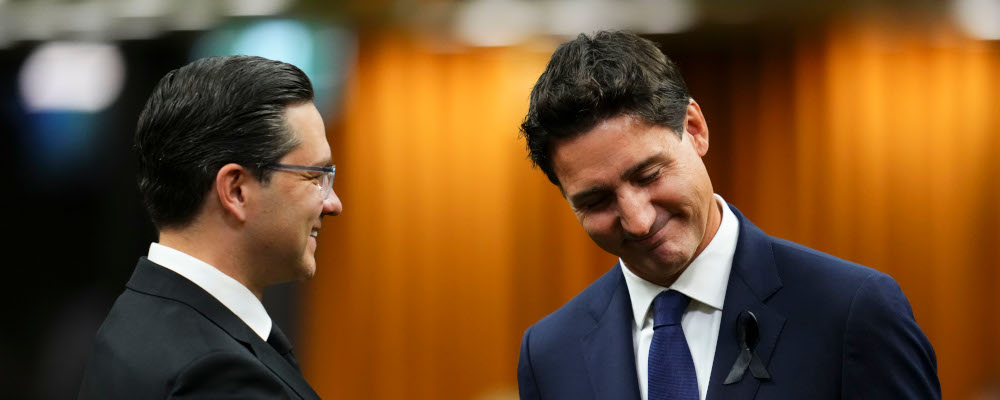2023 has (finally) come to an end. It was a contentious year filled with truly earth-shaking events both internationally and domestically. Does 2024 hold more of the same? Predicting the future may be a fool’s errand, but we are never afraid to look foolish here at The Hub (just look back at some of our predictions for 2023!). With that in mind, here are our predictions, some serious and some not so serious, for what’s in store for 2024.
Anti-Americanism and wedge politics will be Trudeau’s weapons of choice in 2024
By Rudyard Griffiths
Timing is everything in politics, and the autumn of 2024 could present a unique electoral opportunity for the federal Liberals. To state the obvious, the coming calendar year will be dominated by U.S. politics. The wall-to-wall coverage will kick off mid-January with the Iowa primaries and continue at a fever pitch through to the U.S. presidential election on November 5th. Trump, or more precisely, the supposed Götterdämmerung that will arrive with a second presidency for the celebrity New York City developer will consume Americans and Canadians alike. Prognostications of civil war, anarchy, and the breakdown of the liberal international order will dominate our news feeds and stoke widespread political angst.
What better environment could possibly exist for a politically exhausted prime minister and government to make an existential case for their re-election? The TV ads and talking points write themselves. “Trudeau is the only ‘experienced’ leader capable of managing Trump.” “The Liberal Party ‘saved’ NAFTA in the first Trump term and will do so again.” “Poilievre is a Trump proxy with a secret agenda to take away reproductive rights.” And so on, and so on….
Running against Trump as a “global” standard bearer of progressive politics fits perfectly our prime minister’s sense of his own manifest destiny; a kind of modern-day St. George slaying the evil dragon of populism. It also conveniently allows the Liberal party to campaign on something other than its abysmal economic record, profligate deficit spending, and increasingly stale-dated political correctness. In short, the wedge politics (and timing) is too good to pass up. So Hub readers, get ready to head to polls in the next twelve months and don’t quite yet count Trudeau out. Anti-Americanism is one of the great historical constants in Canadian politics and could well provide our embattled prime minister a path to re-election in 2024.

Trudeau will survive, Poilievre will thrive, and the Leafs will win the Cup
By Sean Speer
1. I predicted this past year that there would be no major changes in Ottawa’s political leadership. It turns out that I was right. I have a hunch that the same prediction applies to the forthcoming year. Prime Minister Justin Trudeau will stick it out for the next federal election in part because, over the coming year, the gap with the Conservatives will close some due to the natural rhythm of politics, and in part because even if he’s unlikely to win the election, he’s arguably still best placed to minimize the party’s defeat—particularly in Quebec. So notwithstanding what others might predict, I neither anticipate an election nor a change in the prime minister in 2024.
2. Ontario politics, however, are bound to change in 2024. The Ford government, weighed down by scandal, its underwhelming record, and endemic lack of ideas, will soon find the Ontario population growing tired of it. The coming year at Queen’s Park will therefore come to feel a bit like the past one on Parliament Hill: a government that has reached its best before date and everyone essentially knows it. Voters will just have to wait for a couple of years to officially express it.
3. An underreported story in 2024 will be the ongoing youth movement within federal Conservative politics. The generational transformation of the party’s caucus, which started under Andrew Scheer and Erin O’Toole, will be taken to the next level by Pierre Poilievre. The expected addition of Jamil Jivani and the ongoing nomination of Conservative candidates born after 1984 will set up a possible Poilievre government to be one of the youngest and most forward-looking in Canada’s contemporary political history.
4. As Bill C-11 (the Online Streaming Act) starts to take regulatory shape and younger Canadians face its consequences in terms of their ability to access their favourite online content, internet policy will become the sleeper political issue of 2024. One of its consequences is that the Conservative gains with younger voters will be further entrenched and highly propitious heading into the next election. This will reflect an unexpected and significant undoing of the prime minister’s own youth movement in the 2015 election.
5. Canadian Conservative politics will receive growing attention and praise from conservatives across the Anglosphere. At a time when the leadership of centre-right parties elsewhere seems weak, ineffective, and old, Poilievre’s mix of edginess, rigour, and apparent success will make him a bigger star in Anglo-American conservatism than perhaps any of his predecessors.
6. I predicted last year that we’d see greater ambition with respect to health care from Canada’s centre-right provincial governments. The outcomes of that prediction are mixed. I think 2024 will be marked by a new focus on universities. Provincial governments have tended to tinker on the margins of post-secondary policy. Yet in the face of the campus radicalism (including faculty members) witnessed in the aftermath of October 7, the politics of taking on post-secondary institutions will have fundamentally changed. Alberta Premier Danielle Smith may be uniquely placed to take on these issues, including the defunding of DEI apparatuses on campuses and a reallocation of public funding away from critical studies or other forms of dubious scholarship. One can then envision other provincial conservatives following her lead.
7. Notwithstanding the preferences of Canada’s political class to leave these issues alone, ordinary Canadians will force onto the political agenda difficult yet important questions about Canadian identity, pluralism, and the integration of new immigrants. These issues won’t eclipse basic bread-and-butter ones—namely affordability—but they will loom large over the next two years and make the appointment of the Minister of Canadian Heritage by a possible Poilievre-led government one of its most important.
8. As we move further from the COVID-19 pandemic, the work-from-home model will move more sharply back to pre-pandemic norms of being present in the office. The Hub is part of this trend. It will move into its first office space in early 2024. The one exception will be the public service which will not only contribute to further productivity challenges within governments but also create a growing gap between the work experiences and expectations between those in the public and private sectors.
9. For all of the complaints and obituaries written about Twitter, its growing prominence in AI and its place in the 2024 U.S. presidential cycle will reinforce its significance in the cultural and political spheres of modern life. Elon Musk’s presence, not only as the world’s most successful entrepreneur but also its most influential cultural figure in the world, will grow.
10. Last but not least, I have to return to my final prediction from last year—one that Amanda Lang called me out for virtually as soon as it hit the site. I boldly predicted that the Toronto Maple Leafs would win the Stanley Cup in 2023. In hindsight, I should have said that they’d win the first round. I’m confident this time around though. In 2024, the Leafs will build on this past year’s playoff win by bringing the Stanley Cup to Toronto and Canada for the first time since 1967 and 1993 respectively. You can count on it.
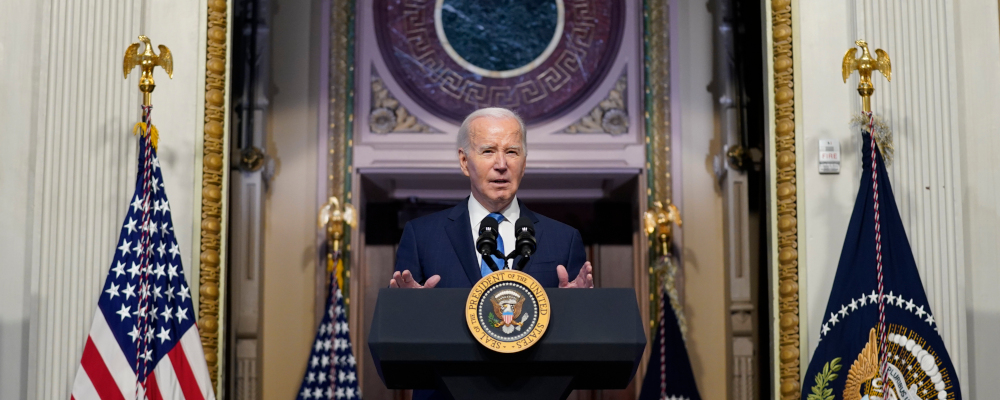
Biden will be re-elected
By Alisha Rao
As Americans prepare for the 2024 presidential election, I am predicting that President Joe Biden will be re-elected. Notwithstanding his current level of unpopularity, a combination of key policy issues (including gun control) and Donald Trump’s own unpopularity (including possible convictions) will help the incumbent president eke it out over the line.
My observation about Trump is worth unpacking. Unlike 2015, it does not appear that the same energy or fervour is quite present for Trump in this cycle in part because of the indictments but in larger part because he seems more unhinged and dangerous than he did last time.
As a result, I think that President Biden is likely to get a second chance at the U.S. presidency.
Antisemitism will continue to grow
By Joanna Baron
In her brilliant 2021 essay collection People Love Dead Jews, writer Dara Horn distinguishes between two types of episodic antisemitism. First: Chanukah antisemitism, so named for the plight of Jews under the Hellenistic regime which outlawed all Jewish religious practice, wherein Jews are permitted to exist so long as they strip themselves of symbols or practices that outwardly mark themselves as different, such as circumcision or support for Israel (”Anti-Zionist, not Anti-Semitic!”, as we’ve heard constantly in the streets since October 7th). Second, “Purim antisemitism”, named for the genocidal Persian regime described in the Book of Esther, where antisemitism takes the simpler form of slaughtering as many Jews as possible (”Gas the Jews!” as we’ve also, sadly, heard in the streets since October 7th).
In the harrowing last quarter of this year, we have seen a revival of both types of antisemitism. October 7th saw an eruption of Purim antisemitism as bad as any recorded in the grim annals of Jewish history. The pogroms of 10/7 were not a genocide, but there can be no doubt that given the ability they would have progressed to one. Just as shattering, though, was the simultaneous spread of Chanukah antisemitism across all quadrants of Western society. Why couldn’t Canadian Jews stop distracting from the war in Gaza and shut up about Molotov cocktails being lobbed at Montreal synagogues and threats against Jewish schools, asked Star editor Shree Paradkar? And vandalizing a Jewish-owned bookstore on the anniversary of Kristallnacht was a reasoned response to Heather Reisman’s support for Israel and had nothing to do with harassing Jews, duh!
As a lifelong classical liberal and Jew, my dedication to free speech, rational debate, immigration as a path to dignity and advancement, and pluralistic multiculturalism is currently being stress-tested. What first principles for a free society apply when some of your fellow citizens support a genocide of your people? What lessons can we glean from episodic outbursts of antisemitism, even in purportedly free societies like Vienna in the 1930s which progressed to, yes, a lot of dead Jews, throughout history? Do we double down on our liberal principles or act out of self-preservation? These questions will become existential in 2024.
Inflation and interest rates will ease—but affordability will worsen
By Trevor Tombe
This year started with inflation at 6.9 percent. It’s ending at 3.1 percent. That’s welcome progress. And if recent trends continue, inflation will very soon align with our 2 percent goal.
A big part of the story is falling energy prices, but there’s evidence that tighter monetary policy in the form of higher interest rates is also helping. If that holds, central banks will start to lower rates in the new year. Indeed, the Federal Reserve Board of the United States is projecting three rate cuts in 2024. Canada should see something similar.
But along with falling inflation and interest rates, Canadians can look forward to worsening affordability challenges in 2024. How can that be? First, nearly one-fifth of mortgages will renew next year and most of those at significantly higher interest rates. This means higher payments and tighter household budgets. The share of budgets going towards interest payments has already risen to record-high levels.
Second, while inflation has eased, prices remain high. Overall, prices are over 15 percent higher today than three years earlier. Food costs 21 percent more. Shelter is 19 percent more. And so on. Meanwhile, earnings are up only 10 percent on average. Excess savings have helped cushion the blow for many, but that can continue only for so long.
Finally, unemployment will also likely rise slightly in 2024. The outlook from several private forecasters suggests the jobless rate may increase to 6.4 percent in 2024, compared to 5.4 percent in 2023. That means substantially lower incomes for hundreds of thousands of Canadians.
While projecting economic trends is tricky at best, it seems clear that while inflation and interest rates will fall, affordability challenges will not.
Foreign interference revelations continue, and David Eby wins another majority
By Geoff Russ
1. Justin Trudeau does not resign and will see a small bump in the polls due to careless CPC mistakes, but it is not enough to make the Liberals competitive again.
2. Speculation about who will succeed Trudeau continues, however, but Chrystia Freeland is not a large part of those conversations.
3. The Parti Quebecois lead the polls in Quebec, and the CAQ looks more and more like a temporary phenomenon of provincial politics.
4. Olivia Chow comes to be regarded as a competent and relatively well-liked mayor, and the Toronto Right will be in shambles.
5. Bonnie Crombie’s attempts to enter the Ontario legislature are troubled as Doug Ford refuses to let her run unopposed in a by-election.
6. EV subsidies continue to flow from Ottawa and come to represent one of the largest expenditures in the history of the Trudeau government.
7. Further revelations of interference by foreign governments in Canadian affairs do not let up.
8. The Alberta government of Danielle Smith and the Saskatchewan government of Scott Moe prove to be remarkably successful in their battles with the federal government.
9. BC Premier David Eby wins another majority in the provincial election, but BC United is devastated and the BC Conservatives form the Official Opposition.
10. Pierre Poilievre’s recent 15-minute documentary about housing is the first of many, confounding his critics on CBC talk shows who say he is all style and no substance.
A senior military leader will resign in protest
By Richard Shimooka
The past year has seen a number of crises affecting Canada and its politics: cost of living/inflation, climate-change-related disasters, and the opioid epidemic, among many others.
One of the less reported or understood is the crisis in the military: outdated and dilapidated equipment, sagging recruitment and retention rates, and crumbling infrastructure. The capability of the forces is collapsing. The past year has seen a number of senior commanders make public statements highlighting the dire situation they face. To the uninitiated outside the military, these comments are worrying but not out of place with other departments’ challenges.
However, within the tightly constrained culture of the Canadian Armed Forces, they are the loudest signs yet to signal the crisis unfolding against them and testing the boundaries of Canadian civil-military relations.
Unfortunately, they do not seem to be having the desired effect. The political leadership has ignored the warnings and continued over-deployment of the CAF, notably to Latvia and various domestic contingencies.
Given the situation and the lack of political acknowledgment of the issue, I think the next step might be a resignation. This is seen as the “ultimate step” to signify the seriousness of the issue among uniforms, and it may be required to bring attention to it.
Even if a senior military leader resigns, will Canadians take notice of the intended message? That remains to be seen—but I am not optimistic.
Pay-for-service clinics are coming
By Chris Spoke
As I revisit my 2022 and 2023 predictions, I think that the former was made two years too early, the latter one year too early. I therefore think that those two and this new prediction will all come to pass in 2024.
This coming year, I predict that we’ll see the first pay-for-service diagnostic clinic open in Toronto offering CT, MRI scans, or both. It will feature a cool brand ID, probably using forest green as a primary colour, a helpful mobile app, and at least one smartly designed brick-and-mortar location–think Juno Veterinary or Pollin Fertility but for convenient annual checkups to see whether or not you have cancer.
And there will be very little controversy about its pay-for-service model outside of newspapers. In fact, most people will be surprised to hear that it’s the first of its kind. The first of many.
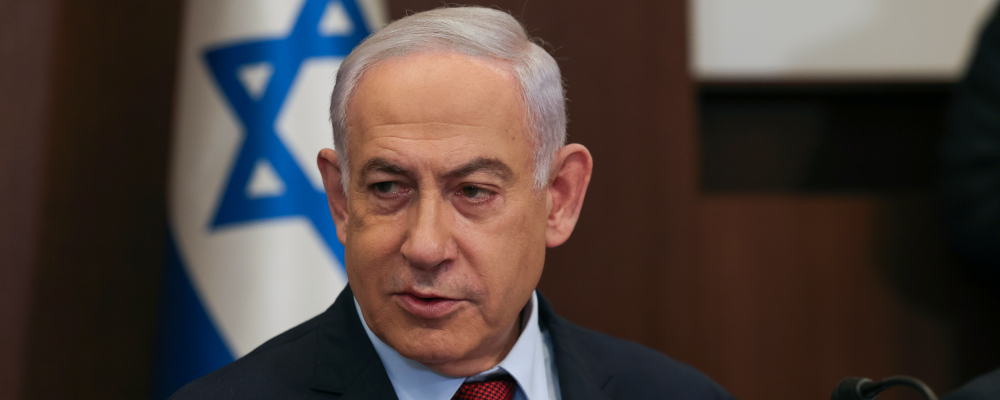
Netanyahu will hang on, deepfakes will increase, and Latin America will become a foreign policy focus
By Amal Attar-Guzman
1. Benjamin Netanyahu will not resign in 2024. Throughout 2023, Benjamin Netanyahu has been facing challenges from all fronts in Israel. In the first half of the year, he faced protests due to his judicial reforms. And since October 7th, while Israeli society has been united on the need to defeat Hamas and bring the hostages home, there have nonetheless been protests against his government’s handling of the hostage crisis and negotiations with Hamas.
Now with extremely low approval polling numbers, there are expectations that he is bound to resign in the new year and that Benny Gantz will aim to become the next prime minister. However, I don’t believe that to be the case. Regardless of one’s opinion of Benjamin Netanyahu, despite challenges such as getting ousted in 2021 from his coalition government and even his ongoing corruption trial, that man has always found his way back to the centre stage of Israeli politics.
2. Deepfakes & AI Technology will be at the forefront of Canadian public policy. For International Women’s Day, one of the under-discussed issues I wrote about was the rise of nonconsensual deepfake pornography. Since writing this piece, the issue is getting worse. According to the 2023 documentary Another Body, deepfakes have been doubling every six months, and researchers are predicting that there will be over 5.2 million deepfakes in 2024. And so far, 90 percent of them depict nonconsensual porn of women.
This has not just been impacting Canadian women in the public sphere, but also minors. There have been reports of teenage girls across Canada have been victims of deepfake nudes. Anyone is at risk of being targeted. And once these images and videos are on the internet, it never truly goes away.
While there are some mechanisms under Canada’s criminal code that can be applied to charge or civilly sue individuals committing these acts, the law is nonetheless limited. Nor is there explicit criminalization of deepfakes and its use to date.
Not only do deep fakes negatively impact us as a gender-based issue, but they also negatively impact Canadian democracy and security. A recently published CSIS report “The Evolution of Disinformation: A Deepfake Future” discussed the challenges of the deepfake threats to Canadian society and security from disinformation, privacy issues, erosion of trust in institutions, and increased social unrest.
With these challenges, along with issues surrounding foreign interference and the use of deepfakes in ongoing global conflicts, Canada will most likely step up in addressing this issue in the new year.
3. Latin America & the Caribbean will become a major region of interest. While Canada’s primary international focus has been on Europe, the Indo-Pacific, and, most recently, the Middle East, one area of the world that may command more attention in 2024 is Latin America and the Caribbean. Most notable will be how the presidential election of populist Javier Milei of Argentina plays out.
But that is not the only thing of interest in the region. Canada has been having exploratory talks of free trade agreements with Ecuador since November 2022, and there have been consultations with the Canadian public and interested stakeholders in early 2023.
However, with the summer assassinations of Manta’s mayor Agustín Intriago, anti-narco presidential candidate Fernando Villavicencio, and politician Pedro Briones, there will be major concerns with how this bilateral free trade agreement will come to fruition given the unrest and rising gang violence, even as newly elected President Daniel Noboa pledges to rebuild the country, strengthen the economy, and crack down on crime.
Further, with the ongoing political instability in Haiti, recent protests and suspension of operations of a Canadian mining company in Panama, the current humanitarian crisis in Venezuela and President Nicolás Maduro’s government wanting to annex Guyana, Canadians will become more aware of the region in 2024.
The housing narrative will catch up to reality
By Steve Lafleur
I predict that 2024 will be the year we realize once and for all that Canada isn’t in a housing bubble.
Canada’s housing market is structurally expensive because we’re short millions of housing units. It’s not because of private equity firms or foreign buyers. They’re not speculating to try to inflate some kind of tulip-like bubble. They’re betting the cost of housing will increase because it’s scarce! Real estate investment trusts will essentially tell you that in their financial reporting.
Defining the problem correctly matters since the solutions to a bubble and a shortage are very different. If this was speculative mania, it could absolutely fall apart. But even with a jarring run-up in interest rates, the bottom hasn’t fallen out on prices. In fact, if you talk to people in the industry they’ll tell you they expect prices to spike again when rates decrease since so many people are just waiting for lower interest rates. When those buyers step in, we’ll see that not even a global pandemic and tight financial conditions could tame this housing market. It’s not a bubble—it’s a shortage. We’ll see that clearly in 2024.

Biden’s health will falter, Terry Fox gets featured on the five, and U.K. Labour wins big
By Harrison Lowman
1. The Republican Party will jump on a health scare President Biden experiences, stoking public fear that he is too old and too decrepit for the job, and should therefore not run in November’s presidential election. President Trump will then challenge President Biden to some show of strength contest, to demonstrate his vitality.
2. “Note-able” Canadian hero and cancer research activist Terry Fox will at last be chosen to be featured on Canada’s new five-dollar banknote, replacing former Prime Minister Sir Wilfrid Laurier. Meanwhile, Canadians will miss Queen Elizabeth’s face on the $20 bill, where she will be replaced by King Charles.
3. Unaffordability and opioid addiction will mean tent encampments will continue to pop up even in small and medium-sized urban areas across Canada, proving difficult for progressive mayors to tackle.
4. The U.K.’s Labour Party will win a majority government, bringing an end to nearly 15 years of Tory rule. Keir Starmer will govern like Tony Blair. “New New Labour” will order its more radical members to “tone it down”, for the sake of maintaining power. They will slowly seek to build back ties with the E.U. as Brexit regret builds. The Conservative Party’s populist base will double down, latching on to recent reality TV star Nigel Farage as a sort of Brexiteer, anti-mass migration messiah.
National unity will be strained, both domestically and internationally
By Taylor Jackson
As someone in their early thirties, I have to say that Canadian national unity seems to be at a low point, at least in my living memory. Look no further than the last few months in federal and provincial policymaking. In late 2023, the federal government changed the carbon tax to implicitly benefit one part of the country, Quebec is bringing in a policy to charge students from other provinces more to attend its English universities, and Alberta just invoked its Sovereignty Act for the first time. These three examples are part of a broader trend, and none speak to a unified country. It’s hard to see how things improve in 2024.
However, Canada is not alone in its burgeoning national unity deficit. Around the world, segments of populations are increasingly focused on their differences rather than their similarities. This will come to a head internationally as more than 4 billion people worldwide will participate in elections, including in the United States, India, Indonesia, Mexico, the European Parliament, Brazil, and Turkey, among others. Many of these will be contentious and indicative of their own domestic fraying. As national unity deteriorates around the world in 2024, I implore politicians of all stripes to start thinking about policies that will bring people together rather than continuing to drive us apart.
Excess inventory will mean sales to be found in the wine world
By Malcolm Jolley
The lede for the Liquor Control Board of Ontario’s December press release, “What Ontarians were drinking in 2023,” says it all: “This year marked a shift in customer purchasing behaviour as Ontarians made more mindful choices that saw their dollar go further.” In other words, consumers noticed that the wines they paid $19.95 a bottle for in 2021 were now priced at three, four, or five dollars more, and figured out that a case of wine that costs $299.40 is a lot more expensive than it used to be at $239.40.
What the press release does not say is that buyers, both big like the LCBO and small like the GM at a group of restaurants, are now sitting on a lot of inventory that people are not prepared to pay for. To the extent that discounts and sales are possible in Canada’s highly regulated provincial markets, they will happen. Keep an eye out for bargains. I will report back on any I find.
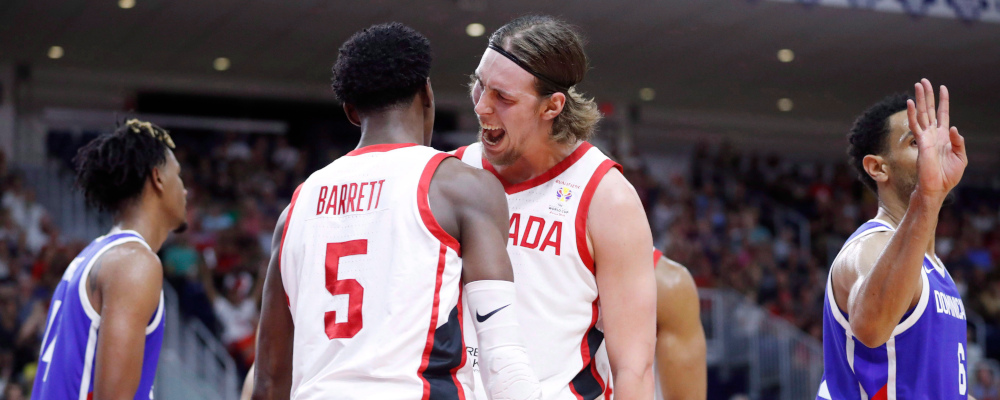
Canada’s men’s basketball team will medal in the 2024 Paris Olympics
By L. Graeme Smith
I could write about the ways in which an upcoming American presidential election featuring Donald Trump,A prediction in itself, I suppose. an increasingly insecure international global order, and a faltering, desperate Liberal government here at home will coalesce into a particularly toxic, destabilizing brew for domestic Canadian politics this year, but no. I’m going to ignore all of that to focus on what really matters.
Piggybacking off my nomination for stand-out Canadian of the year, my light-hearted but completely serious prediction for the new year is that Canada’s men’s basketball team will medal in the 2024 Paris Olympics. How bold of a prediction is that? Prior to the recent third-place finish at this past FIBA Basketball World Cup, it had been 87 years since a Canadian men’s squad had medalled on the international stage. Yes, if you did the quick math, that was the 1936 Berlin Olympics. Until this past September, Hitler himself had seen more success for Team Canada on the court than almost any living Canadian. Poor showing for the country that birthed the creator of the sport.
But given the long-awaited emergence of some genuinely impressive talent—and talent that’s finally willing to commit to playing for the red and white—Canada should do James Naismith himself proud this year in Paris.
Things are only going to get worse
By Howard Anglin
Last year I wrote that “2023 will be another of what future generations will remember as ‘the last of the good years’” and that “no new year will ever again be as good as the preceding year. Not in our lifetimes.”
The year whose dust we are now shaking off our feet lived up to that prediction, and I’m betting 2024 will too. Everything—materially, socially, spiritually—will continue to get worse. The best case scenario for AI is that it does to the middle and upper-middle classes what off-shoring did to the working class in the 1990s, expanding our epidemic of tranquilised despair. The worst case doesn’t bear thinking about. Even the anticipated medical breakthroughs will just prolong lives that are worse in every meaningful way than they would have been a decade before.
And as bad as things get, there is no going back. The tawdry, disposable culture force-fed to us through anxious screens will look like a Norman Rockwell childhood compared to what is coming. All we can look forward to are moments of respite and false hope, or (pray for it!) Armageddon. So savour each passing year before it too slips out of reach and into a past that we describe wistfully to our uncomprehending children. If we have any.
Recommended for You

Poilievre will survive as CPC leader, and Canada will stay golden in men’s hockey: The Hub predicts 2026
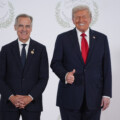
Supply management will be sacrificed to appease Trump, and the Netflix takeover is bad for Hollywood: The Hub predicts 2026
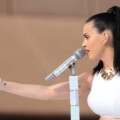
Canada will attempt to join the EU and Justin Trudeau becomes a Katy Perry lyric: The Hub predicts 2026

Why Danielle Smith is the newsmaker of the year

